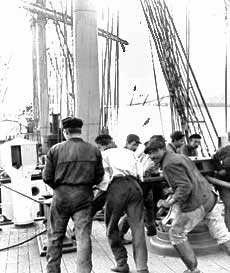Adam Hutchison
Working The Waters
April 24, 2007
<!--[if !supportEmptyParas]--> <!--[endif]-->
Power in the Puget Sound
<!--[if !supportEmptyParas]--> <!--[endif]-->
The Puget Sound was a very diverse place in the early 1800’s. Alexandra Harmon debunks the common misconception that all “Indians” are the same while discussing the intricacies that supported the individuality of each of the many tribes in the area. These individualities existed alongside a strong connection with their neighbor tribes caused through their novel method to solve disputes. When representatives of Hudson’s Bay Company set up camp in the Puget Sound region the entire “Indian” social system shifted.
<!--[if !supportEmptyParas]--> <!--[endif]-->
The changes, both positive and negative, weren’t fully realized by the King George men or “Indians” until much later. The changes were gradual though dramatic and began when Hudson’s Bay Company disturbed the waters of the Puget Sound.
<!--[if !supportEmptyParas]--> <!--[endif]-->
Prior to the arrival of King George men, the “Indians” of the Puget Sound lived with a strong connection to the land. Their survival depended on the bounty that they could pull together with primitive but ingenious tools. They also had a system of conflict resolution that was unlike any that the King George men had experienced. By solving intertribal disputes through marriage, it is clear that though the tribes live apart and live separate lives they are connected through some common genetic codes.
<!--[if !supportEmptyParas]--> <!--[endif]-->
When a tribal conflict arose these tribes had managed to put together a system where they could diagnose the problem and devise a solution, sometimes a war, but more often a marriage between the tribes. Without getting into the moral questions surrounding forced marriage, these tribes had a fairly good system of conflict resolution in place – one that was consistent and left both parties happy.
<!--[if !supportEmptyParas]--> <!--[endif]-->
The King George men, with their different culture and language, had a much different social system. They did not come into the Puget Sound with much of a social agenda – they came to trade. They came into this lush, resource-filled region to extract as much as they possibly could, giving back as little as they had to. It is this attitude that all conflicts between “Indian” and King George men societies’ stem from. The King George men had had success with this system before, and although there were clear differences between these “Indians” and the “Indians” living elsewhere in North America whom they had dealt with before, the common belief at the time was that the same attitude toward trade would suffice.
<!--[if !supportEmptyParas]--> <!--[endif]-->
The major difference between these two cultures was their perception (and the realization) of their power. To the King George men, power was a very tangible thing – the search for wealth, and the power that comes from it, dominated their lives. To the “Indians,” power was much less definable – there was spiritual power, social wealth and physical comforts. This difference amplified differences in the cultures of the two societies.